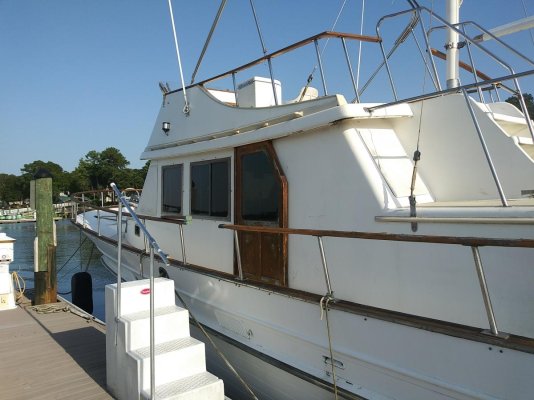thataway
Senior Member
- Joined
- Dec 8, 2018
- Messages
- 139
- Location
- Florida
- Vessel Name
- Thataway
- Vessel Make
- C Dory 25, pilot house trailerable cruiser
yeah seems like the 3607 can be had from the mid teens up to the mid 30s'40's I've been trying to do more and more research on them and it seems like it was offered as a "budget" yacht that has had it fair share of problems from issue with the appliances to some of the motor mounting. Once we go down to florida it wont be coming back, we plan on moving down to the cape coral/ ft myers area and once we leave these grey skies there is no coming back! lol
Thanks
I think you pegged the Carver well. I owned the prototype for the 32' aft cabin boat--one of several with Diesel engines. I also owned a 41' aft cabin MY, which had a whale of a lot more room.
Some of the problems which the Carver may have will be wiring, engines which are near end of life span, transmissions which may need rebuilding, fuel tanks which are nearing 40 years old--and a potential very explosive hazard. There will be leaks around windows--that is almost guaranteed in this vintage boat. Not all that hard to fix, but time consuming. In the mean while live with the mold and dips onto the bunk...There may be soft decks, and you really don't want to go there!
We also have boated with dogs for over 45 years (Including crossing oceans). It is very doable. But it does complicate the issues a little bit.
I agree with those who think that a cheap boat, will be very expensive by the time you are through. Then there is the issue of resale when you decide you don't like boating or want to "trade up".
We have lived aboard about 13 1/2 years total, so know a little about what is required. Over 8 years of that was full time cruising, and much at anchor. You have to have very reliable systems.
Now as to how you might accomplish what you want. I really believe that living on a mooring to start with is not a good idea. AC in Florida is one of the issues. We never had AC on our sailboats and spent cumulative time of over 18 months in the Caribbean tropics. But there was always a breeze blowing thru the hatches. Something called a "Wind scoop" which passively funnels air into the cabin.. Once we got to FL--we realized that in most marinas there is little wind--and more than fair share of rain at night...so the AC became essential. That could be as little as a window unit ducted with plywood thru a hatch, and a small generator running on the swim step some distance from sleeping quarters, with several CO detectors on.
There is no way you are going to run AC off solar power, even with a 5000 watt AC (and I have run that type off a bank of golf cart batteries). It can work for one small combined and well insulated space on a boat... there are also dedicated 12 volt AC units, which can cool small spaces. It is not practical to run generator full time for AC on small boats.
A large dinghy with a fairly small boat--done that too...It is much easier to have An inflatable with low hp--we have an air floor inflatable, with a Torqeedo electric Motor currently--it can be solar charged: no gas to worry about, goes plenty fast to get to shore. Another option is an aluminum skiff--10 to 12 feet long--lots of interior space, and cargo capacity--again a small or electric motor. Easier to tow or stow than a CC or whaler etc.
Living aboard and anchoring or mooring out has its issues. A composting toilet will get by the "holding tank" issue and pump outs. I feel the most efficient refrigeration/freezer is using an eutectic holding plate system with excellent insulation. Then the compressor only has to be run twice a day for about an hour.
Living aboard anchoring out full time is a hot topic still in Florida (where I live).
If you want to live in Fl, come on down, buy and flip some houses, buy a nice boat to park in front of that waterfront home, and re-do it here.
You asked about "Standards"--ABYC (American Boat and Yacht Council) has standards for boats--sort of like "codes" for buildings. You should learn these before starting any work on the boat. Also Nigel Calder has several good books on mechanical and electrical issues which will follow ABYC standards. Buy the book and read it.
You should spend time reading books and forums. No one is going to "Validate" your plan as it is now. There are way too many loose ends, and not practical to do items.
Regards




